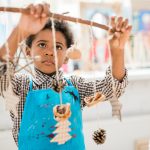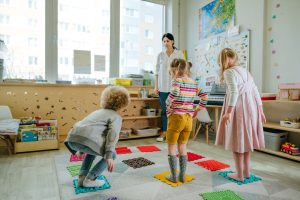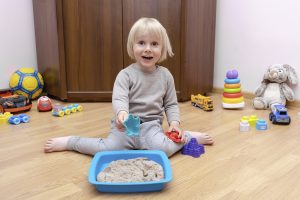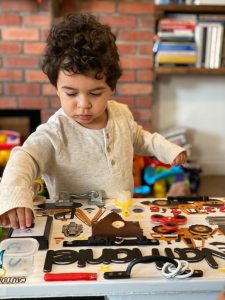How Playtime Unlocks Learning and Growth?
Welcome to the extraordinary adventure of understanding how our little ones re learning through play. It’s like peeling back layers of a fascinating storybook, where each page reveals the magic of children’s cognitive, social, and emotional development. And guess what? Play is the secret sauce that makes it all happen!

The ABCs of Thinking
So, let’s start our journey by understanding the ABCs of your tiny thinker’s mind. Imagine them as little scientists, constantly experimenting and figuring out the world. The research on child development unveils the superhero power called ‘theory of mind.’ This power helps them grasp what’s going on in other people’s heads, shaping how they learn and perceive the world. For example, when your toddler realises that their friend might want to play with the same toy, it’s a lightbulb moment in their theory of mind development.

Playtime: Where Skills Take Flight
Now, let’s talk about the powerhouse of development – Learning through play. It’s not just fun and games; it’s the playground of skill development! Take building blocks, for instance. It’s not merely stacking; it’s a lesson in spatial awareness, hand-eye coordination, and problem-solving. Each play session, whether it’s make-believe adventures or puzzle-solving, is like a mini workshop where they’re not just having a blast – they’re secretly becoming little geniuses, developing cognitive, social, and emotional skills
For instance, consider imaginative play. When your little one pretends to be a chef in their toy kitchen, they’re not just cooking up imaginary meals. They’re developing creativity, social skills by hosting a pretend dinner party, and even enhancing language through storytelling.
Scribbles, Paints, and Masterpieces
Now, what about those messy art sessions? Scribbling, painting, and drawing are not just about creating masterpieces for the fridge. These creative adventures are crucial for fine-tuning those little fingers. It’s not just about the end result; it’s the journey of self-expression and skill refinement
For example, when your toddler engages in finger painting, they’re not just making a colourful mess. They’re improving their fine motor skills, exploring different textures, and expressing their emotions through art. It’s a holistic experience that goes beyond the final artwork hanging proudly on your fridge door.
Friends and Words: The Social Language
Now, imagine your tot in a world of giggles, chatter, and copying from whiteboards. Social interactions are like language boot camp! They’re picking up words, expressions, and communication skills. It’s not just playdates; it’s language school in action!

Consider a scenario where your child engages in a playdate with a friend. They’re not just sharing toys; they’re navigating the social landscape, understanding the give-and-take of conversation. When they copy words from a whiteboard in a playful literacy activity, it’s not just about writing – it’s about developing early literacy skills while having fun.
Let’s Write Together
Ever tried a writing adventure with your tiny tot? It’s not just about letters on a page; it’s a teamwork treasure hunt! When they express their thoughts, and you assist in the writing process, it’s like a literacy magic show [3]. Writing becomes a fun journey, not a daunting task.
Consider a scenario where your child wants to tell you a story. Instead of you writing it for them, imagine sitting together, with them dictating and you writing down their imaginative tale. It’s a collaborative effort that not only enhances literacy skills but also strengthens the bond between you and your child.
All-Around Learning Fun
To truly grasp the wonders of how kids are learning through play, think of it as a big puzzle. Each piece represents a different aspect – cognitive, social, emotional, and physical – all fitting together. Learning and development are like a dance, with one influencing the other. It’s not just about school subjects; it’s about the whole enchilada!

For instance, picture a day in the life of your child. In the morning, they may engage in a building block activity, enhancing cognitive skills. During lunch, an imaginative learning through play session sharpens their social and emotional intelligence. In the afternoon, a creative art project refines fine motor skills, and an evening literacy adventure with you nurtures language development. It’s a day filled with diverse learning experiences, each contributing to their overall growth.
Learn Through Play Unleashed
As we wrap up this amazing journey, remember, that understanding kids’ learning is like reading a thrilling book. We’ve explored the basics of cognitive development, dived into the play-filled world of skill building, celebrated creative escapades, cherished social language lessons, and embarked on literacy adventures. It’s all about seeing the big picture, the holistic view that lights up the path to better early education.
So, here’s to the little scientists, artists, and chatterboxes – may their journey be filled with play, laughter, and endless discoveries!
FAQ
How can parents encourage expressive learning?
Parents can encourage expressive learning by providing various art supplies, engaging in creative activities together, and appreciating their child’s artistic endeavours.
Why is social interaction important for language development?
Social interactions expose children to diverse language patterns and communication styles, significantly contributing to their language development.
Is playtime really essential for a child's development?
Absolutely! Play is a crucial aspect of a child’s development as it enhances cognitive, social, and emotional skills.
Are guided practices only beneficial for literacy development?
No, guided practices extend beyond literacy; they enhance overall communication skills and foster a deeper understanding of various subjects.